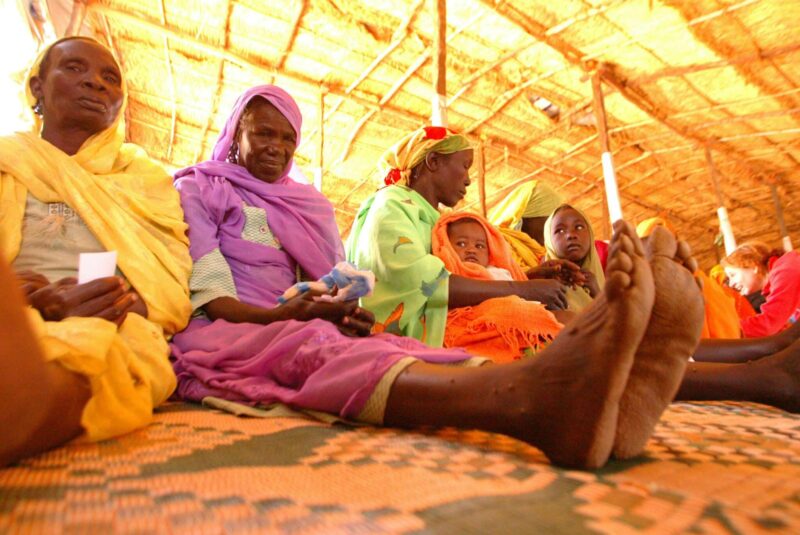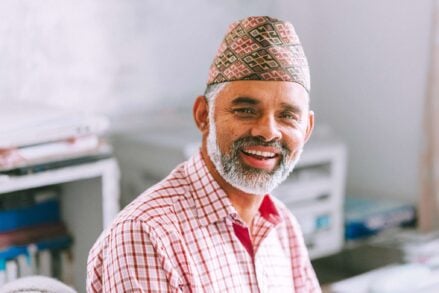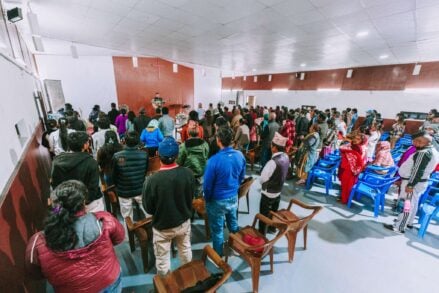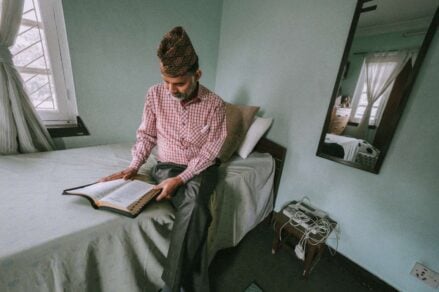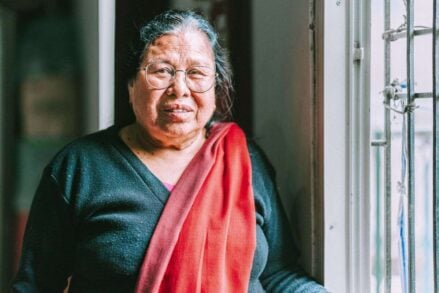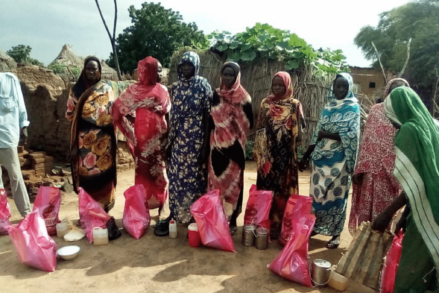How Christianity in Sudan is under siege
Q: Explain for our readers exactly how the war is harming Sudanese Christians. How much are Christians in Sudan suffering, and are they targeted by either of the warring groups?
RBM: Christians are suffering terribly. There is a figure that 165 churches have been destroyed so far. The stories of deprivation and violence are heartbreaking. Mainly this is because the paramilitary group known as the Rapid Support Forces (RSF) specifically uses churches as their headquarters.
They take over church buildings, kill pastors, and then the Sudanese Armed Forces (SAF) on the other side bombards the church because they know rebels are in there. When the army or the RSF enters an area, they look for large buildings with good walls to house the fighters. That’s invariably a church or another type of religious structure. Then they sweep the area with fearful killings. This is why we say that the Sudanese church is under attack.
Q: What are persecuted Christians in Sudan saying in the midst of the civil war?
RBM: Let me share a quote from a Christian pastor in the Darfur region whom I managed to speak with from a satellite phone. He said, “We just pray the world will notice, and insist on humanitarian corridors so that the dying and the starving can be stopped. We are solely focused on survival right now, as everyone is.”
He also added, “Please tell the leaders of the churches and anyone with a Christian conscience to put pressure on the belligerents, and even on those who keep supplying them with arms and bombs. Try sanctions. Try something. Anything. Just stop the dying.” Another Christian leader from the north described the brutal conflict’s impact on Christianity in Sudan: “We are being devoured by both sides. There is genocide—of any group that stands in their way. There is no moral context anymore.”
Q: Is religion a factor then in this new conflict?
RBM: This is an unusual civil war for Africa, because it’s not primarily about religion or tribal differences. It’s a fight between two factions who want to make themselves even richer by expanding their exploitative rackets. And unfortunately Christianity in Sudan has become a secondary target since the warring parties like to take over church buildings for military purposes, with absolutely no regard for the lives and well-being of the believers in the area.
The brutal facts behind Sudan’s civil war
Q: For the last five years we’ve been told that Yemen had the greatest humanitarian need of any country in the world. But now, suddenly, the UN says it’s Sudan. What is the extent of the devastation, and why is it being highlighted now?
RBM: Well, the statistics are dire. Sudan is the third-largest African state, with a population of around 49 million. Over the past year, Sudan’s civil war has resulted in at least 150,000 deaths and displaced approximately 12 million people—over 20% of the population. It is subsequently experiencing the worst famine in 40 years.
Credible sources are estimating that 2.5 million people will die of starvation before the end of the year. It is harvesting season now, but the war is preventing any agricultural activity for the second year in a row. In fact, if emergency relief is not rushed into Sudan now, 300,000 are expected to die before mid-October. I think the world is just now realizing the severity of the crisis partly because it’s so recent—the conflict only began in April 2023, making it a relatively young war.
Q: Who are the parties in conflict, and how did the war start?
RBM: The leaders of the army and an auxiliary paramilitary force fell out, launching a vicious war over control of the country’s resources—especially its gold and oil. It’s a war driven by greed. The army, called the Sudanese Armed Forces (SAF), is led by General Abdel Fattah al-Burhan. The paramilitary group, known as the Rapid Support Forces (RSF), was created in 2013 under General Mohamed Hamdan Dagalo. The RSF has a notorious origin as the shameful Janjaweed militia, which fought rebels in Darfur starting in 2003. During that time, they became infamous for conducting ethnic cleansing against the region’s non-Arabic population, including Christians.
Q: But Sudan was run as a military dictatorship for years. How did a rebel army gain so much power?
RBM: It all stems from the paranoia of the previous military dictator, Omar Al-Bashir. He came to power through a military coup in 1989, and faced the same perpetual problem most dictators do—how to expand control over the country through the military while at the same time making sure it doesn’t become powerful enough to overthrow those in power. His solution was to create and allow another sizeable paramilitary force, which divided military power and gave him a fallback option of calling on another group that could suppress mutinies, if necessary. It was a very risky strategy, and he allowed the RSF to grow wealthy by dealing in gold and oil.
Q: Did it work or not?
RBM: Al-Bashir was eventually ousted in a coup in 2019, ending 30 years of rule, which had imposed an extreme version of Islam on the country. There had been a wave of pro-democracy demonstrations, and General al-Burhan of the SAF deposed him. A civilian government was then formed under Abdalla Hamdok. They wrote a transitional constitution and began dismantling the oppressive Islamic Sharia system, which was great news for the Christians of the country, who make up about 5% of the population.
It was a time of great optimism. Sudan was even removed from the State Sponsors of Terrorism list, allowing access to IMF funding. Two years later, the country was taken off the State Department’s watchlist. They managed to repeal the apostasy law, although they had less success with the blasphemy law. The two leaders of the military factions got together and mounted a coup in October 2021, and the country has been marching backward ever since.
Q: Do we know what caused them to turn against each other?
RBM: There are speculations that they had differences over the future direction of the country. The main issue seems to have been over how the RSF would be integrated into the regular army. Al-Burhan of the SAF didn’t want to repeat Bashir’s mistake of allowing a separate force, but as talks progressed, Dagalo of the RSF sensed an attempt to sideline him.
The RSF is also very wealthy and known to be heavily involved in human trafficking. Militaries in these countries invariably double as criminal enterprises or control significant portions of the economy, making the generals rich beyond their wildest dreams. Meanwhile, the people always end up paying the price. So far, there is no incentive for either side to seek peace.
Q: Why is Sudan’s civil war so vicious?
RBM: It’s vicious because the two sides are ruthless and, it seems, well-armed by outside forces. The traditional SAF army fights along more traditional lines, using tanks, bombardments, and occupations, with support from an air force. The RSF operates more like a guerilla force, using genocidal tactics when they capture an area. But it’s hard to say that one side is much better than the other. This is a very brutal war.
Q: Is there evidence that both sides are being armed by outside powers? Who are they, and why are they involved?
RBM: Yes, there are a lot of resources at stake. Sudan has significant oil reserves in the south and gold in the west. Human Rights Watch recently released a report showing that the weaponry both sides are using is so sophisticated it must be coming from abroad. There is credible evidence that the United Arab Emirates (UAE) is arming the RSF, while Iran and Egypt are supporting the SAF. But other powers are playing both sides. Especially Russia, who covets the gold. Additionally, weaponry and advisors have been supplied by Saudi Arabia, Turkey, and Qatar.
How Christians in the West can respond to the civil war in Sudan
Q: There is no mention of any Western power arming the RSF or SAF. Why is that?
RBM: The West’s geopolitical focus is on containing China, supporting Ukraine amid Russia’s invasion, and ensuring that conflict in the Middle East doesn’t escalate into a full-scale war. The U.S. government has attempted to negotiate cease-fire talks for Sudan, arranged in Geneva, Switzerland recently. However, the RSF didn’t bother to show up.
Q: Some have called Sudan’s civil war “a forgotten war.” Does that mean it’s not geopolitically vital? And how might it impact Christianity in Sudan in the future?
RBM: This is so important. A recent issue of The Economist magazine said that Sudan really does matter internationally, and the great powers should be much more involved. The article argued that if Sudan is allowed to destabilize, then so will much of Africa. Sudan is bordered by seven states, accounting for 21% of Africa’s landmass and a population of 280 million. Countries like Chad, Egypt, Ethiopia, and Libya can expect disruptive flows of refugees, guns, and mercenaries.
Europe is beset by refugees from Sudan, with an estimated 60% of those in camps in Calais, France, attempting to illegally cross the Channel into the UK. These western democracies may expect a dramatic upsurge in refugee flows. It’s no good cracking down on people smugglers. Who would want to stay in a war zone like Sudan? There is also a religious dimension. There’s concern Sudan might once again become a haven for Islamic extremist groups, threatening Christianity in Sudan. These extremists may also export their arms and ideology to surrounding areas.
Q: How can we in the West even begin to feel the horror and pain the people of Sudan are experiencing?
RBM: The fact of the matter is that Christianity in Sudan is synonymous with suffering right now. I recently thought of a family in the capital of Khartoum, a city of seven million people, who said, “not a single pharmacy exists in the entire city.” This is a place where most people have nothing—not even the basics like clean water, electricity, or medicine. Pity our Christian brothers and sisters who are suffering from displacement and famine. Keep in mind that many Sudanese people are witnessing their children die from preventable conditions, knowing they may soon follow them to the grave. Sudan’s civil war truly breaks the heart.
I also feel a deep sadness because, when I wrote the book Faith that Endures: The Essential Guide to the Persecuted Church in 2007, Sudan was one of the tap roots of Islamic extremism in the world. The military dictator Bashir had linked up with a hardline cleric, Hasan al-Turabi. This terrible twosome made Sudan one of the worst places in which to be a Christian. Extremists the world over—including Osama Bin Laden—made their way to Sudan to learn from al-Turabi. But then al-Turabi (who has since died) and Bashir fell out, and with the 2019 protests ushering in a new era, the extremism of the regime began to be dismantled. We all had such high hopes for Christianity in Sudan to thrive. The only good news is that Sudan is not a country that typically exports Islamic violence—but it could happen again.
Q: Is there any hope in this situation for Christians in Sudan?
RBM: The Christian pastors will tell you they place their hope in God, and that their prayer meetings have never been more intense. They urge us to “pray that Jesus will appear to the Generals in person, so they will turn from their violent paths.” Exhaustion is also playing a part. The country is on its knees. Although the war is only 17 months old—not a long war by the usual standards—it has spawned great despair that could yet be a force for peace.
Q: How can we help suffering Christians during Sudan’s civil war?
RBM: Your prayers and support are invaluable right now. They can help strengthen the Sudanese church as it is under extreme threat. Pray for the areas where the church is organizing and handling relief efforts. Sudan is a vast and diverse country. As such, not all churches are bombed and closed—many are still functioning.
Additionally, pray that aid can come into the war-torn country. As I mentioned earlier, Sudan is bordered by no less than seven countries. It is possible to bring aid in from some of these places across a very porous border, especially in South Sudan, where the Christian Nuba people are. Many of them have family across the border, which creates opportunities for aid.
Another way to help is to make a gift to a charitable organization. Global Christian Relief is providing emergency famine kits to hundreds of Sudanese Christians and their children as the humanitarian crisis worsens. It’s in situations like these—even seemingly impossible situations—where relief and support becomes possible through the collective efforts of the Body of Christ.
About Dr. Ron Boyd-MacMillan
Ron is the Chief of Research & Global Strategy at Global Christian Relief. A leading expert on Christian persecution, he is also the author of Faith that Endures: The Essential Guide to the Persecuted Church—the first comprehensive text on how to understand, support, and learn from the persecuted church. He invites you to read more stories of persecution on the GCR blog.

